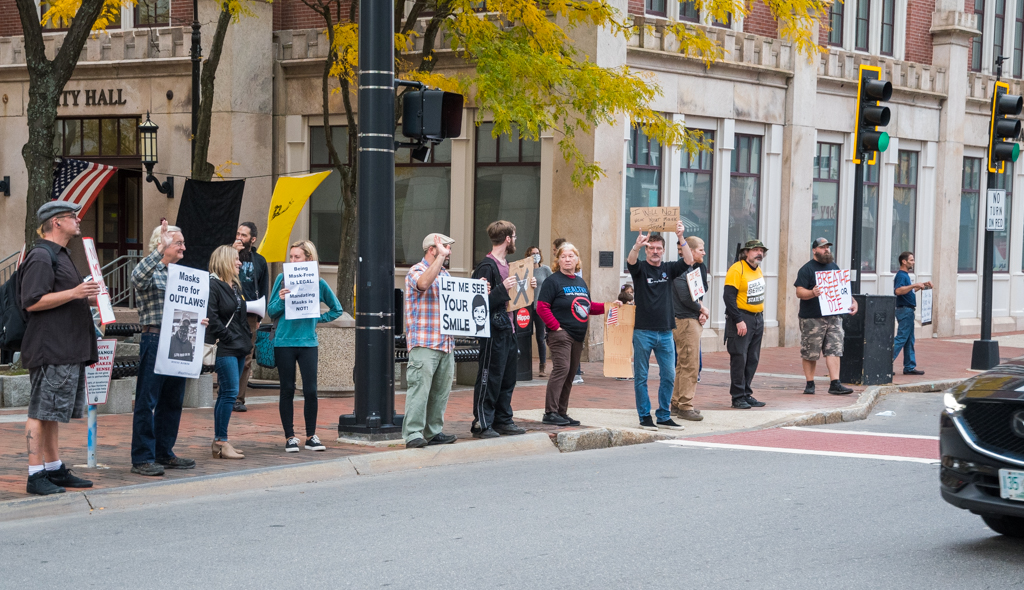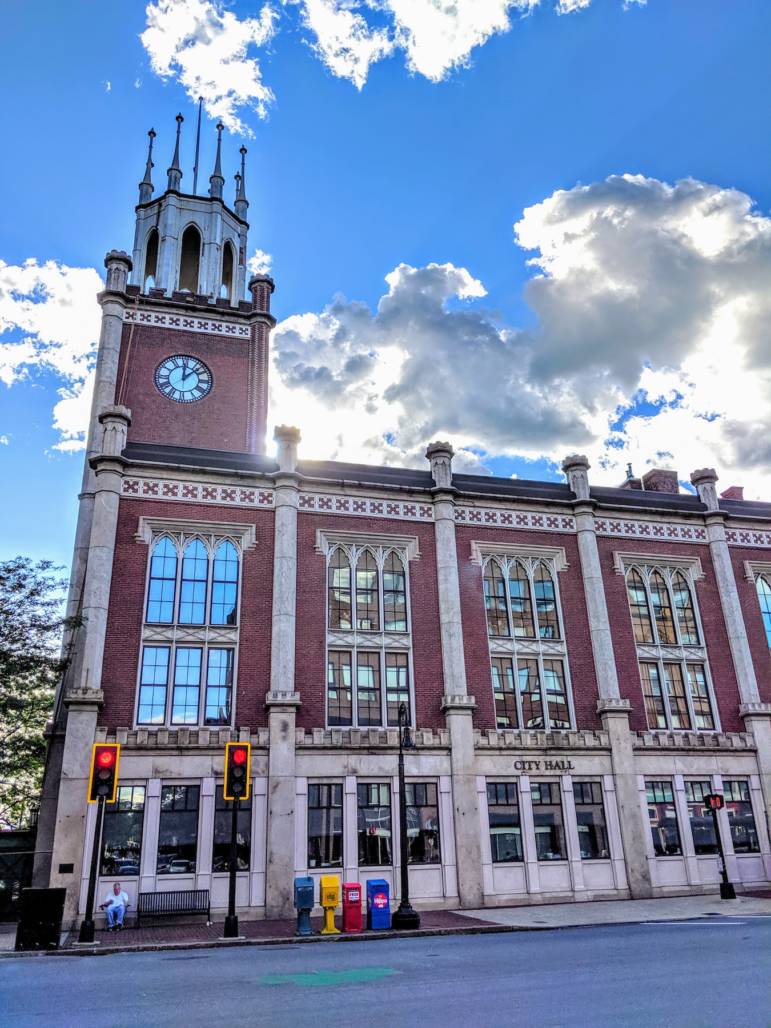MANCHESTER, N.H. – Anyone entering a city building in Manchester will now have to wear a mask, but those people can still take it off when they’re elsewhere in the city.
On Tuesday, the Manchester Board of Mayor and Aldermen approved a new rule requiring anyone entering city buildings to wear a mask when they cannot socially distance with some exceptions but killed a further discussion on a similar ordinance that would extend required masks for every indoor public place in the city.
The city building rule was proposed as a way to keep city employees and members of the public safe while on city property. The rule did not specify any punishment for those violating it, only noting that the Board has the authority to pass the rule under state law. The rule does not apply to Manchester schools, which already have stringent policies regarding masks in their buildings.
Mike Porter (Ward 8) asked this new rule would allow the Aldermen to return to in-person meetings, and it would although the meetings would be limited to only 18 people excluding the Mayor and Aldermen. If the Aldermen can maintain six feet of social distance, they would also not have to wear a mask if in-person meetings return.
However, City Solicitor Emily Rice said that allowing people to wait in line outside the meeting until someone else leaves would violate open meeting law.
Joseph Kelly Levasseur (At-Large) challenged Mayor Joyce Craig regarding the legality of her decision last week to hold Tuesday’s meeting remotely without consulting the Aldermen outside of Vice Chairman Dan O’Neil (At-Large).
Levasseur also alleged that Craig made the move to return to remote meetings due to unruly behavior.
“Your problem was with people who came in, there was one guy who was ridiculous I agree, but we shouldn’t have to suffer because of that one guy,” he said.
Levasseur advised that police could remove anyone acting inappropriately during Aldermanic meetings, but this assertion was challenged by Manchester Police Chief Ryan Grant later in the meeting, stating that police can only enforce laws and it’s unclear if they can enforce rules.
Craig shot back at Levasseur’s assertions, stating that the move to hold remote meetings was only taken after extensive discussion with O’Neil, City Clerk Matt Normand and members of the Manchester Police Department, Fire Department and Health Department.
“There’s nothing more I’d like, trust me, than to continue meeting in person. But I will not put department heads or the public at risk,” she said.

Porter also expressed concern over the Aldermen not being consulted over the decision regarding remote meetings.
“I’m not angry, but if you’re going to invite one Alderman, you should invite us all somehow. We can’t view the chairmanship as more than what it is and that conversation and that vote was taken away from us,” said Porter.
O’Neil was concerned that the rule did not go far enough, noting that many private businesses in the city have much stricter requirements.
The rule passed by a vote of 9-4. It was supported by Kevin Cavanaugh (Ward 1), Will Stewart (Ward 2), Pat Long (Ward 3), Anthony Sapienza (Ward 5), Ross Terrio (Ward 7), Bill Barry (Ward 10), Normand Gamache (Ward 11), O’Neil and Porter. The rule was opposed by Jim Roy (Ward 4), Barbara Shaw (Ward 9), Keith Hirschmann (Ward 12) and Levasseur.
A motion to table a request to send the city-wide mask ordinance failed 6-7, with Levasseur, Terrio, Roy, Gamache and Hirschmann voting to table and the others voting in opposition.
With the motion to table defeated, discussion ensued on whether the proposed ordinance would be referred to the Aldermanic Committee on Second Readings.
From there, it would have returned to the full board in November and then referred to the Committee on Accounts until a final vote on it would have been taken in December.
Cavanaugh said that time frame alone was enough to continue discussion on the proposal, given the attention that discussion has put forward toward the issue.
While Porter agreed that the discussion was valuable in itself, he quickly opposed the measure. Porter said he personally wears a mask and strongly encourages others to wear masks, but also said his constituents were strongly opposed to a mask mandate.
Barry also opposed forcing businesses to submit to the ordinance.
Roy called the ordinance “useless,” much like the challenged panhandling ordinance several years ago, and told the board he had heard from businesses that would leave the city if it were passed.
Hirschmann went further, saying it would kill the city and that if the objections of every single person were read into the record, it would take days. He echoed Barry’s statement, noting that most businesses in the city already require masks.
The status of Nashua was also mentioned frequently, as its mask mandate did not prevent an outbreak at their City Hall, with their COVID-19 figures still among the highest in the state.
Shaw said that she believes 90 percent of Manchester residents already wear masks, and that no ordinance would convince the other 10 percent to change.
“I don’t believe in passing bills that are just feel-good things,” she said. “We all know the facts we all know what to do and we don’t need to be told.”
At Monday’s Aldermanic Committee on Administration and Information Systems, the proposed fine was replaced with education about the importance of masks and a free mask for the violator, but questions on how that penalty would be enforced was questioned by Levasseur.
Health Department Director Anna Thomas told Levasseur that education is already occurring, primarily when complaints are levied against businesses regarding violations of Governor Sununu’s Reopening Guidelines.
While opponents reference the large amounts of opposition they have received from constituents, supporters such as Long and Sapienza referenced voices of support they heard as well.
Sapienza noted the heads of Manchester’s hospitals have contacted him, and talked about the importance this ordinance would have. Long noted concerns from constituents who already wear masks but are accosted by those without masks. O’Neil said Shaw’s estimate was likely low, but even raising the total percentage of people wearing masks by just one percent would be worth it for the people of the city.
Cavanaugh, Stewart, Long, Sapienza and O’Neil voted for the motion to move the proposal to committee while the other eight Aldermen voted in opposition.
The original wording for both proposals before the amendment removing monetary fines can be found below.








